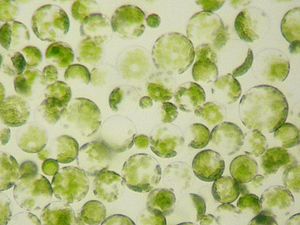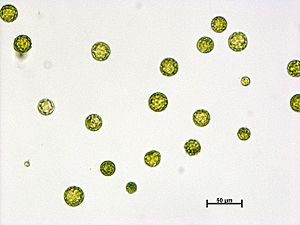Protoplast facts for kids
A protoplast is a special kind of cell. Imagine a cell from a plant, a fungus, or even some bacteria. These cells usually have a tough outer layer called a cell wall. A protoplast is what's left of that cell when its cell wall is completely taken away.
This means you're left with the cell's main body. This includes the nucleus (the cell's control center) and all the squishy stuff around it, called protoplasm. Scientists remove cell walls to study cells better or to change them.
Contents
How Protoplasts Are Made
Cells from different living things have different kinds of cell walls. Because of this, scientists use different tools to remove them. They often use special chemicals called enzymes. These enzymes are like tiny scissors that can break down the cell wall without harming the rest of the cell.
Enzymes Used to Remove Cell Walls
Cell walls are made of many different types of polysaccharides (complex sugars). To make protoplasts, scientists use a mix of enzymes that can break down these specific sugars.
Here are some examples:
| Type of Cell | Enzyme Used |
|---|---|
| Plant cells | Cellulase, pectinase, xylanase (these break down plant cell wall materials) |
| Gram-positive bacteria | Lysozyme (this enzyme breaks down bacterial cell walls) |
| Fungal cells | Chitinase (this enzyme breaks down the chitin in fungal cell walls) |
Why Protoplasts Are Useful
Removing the cell wall is very important for many science experiments. It makes the cell much easier to work with.
For example, protoplasts are often used in DNA transformation. This is a process where scientists put new DNA into a cell. If the cell wall were still there, it would block the new DNA from getting inside. By removing the wall, scientists can create genetically modified organisms (GMOs).
In the case of plant cells, protoplasts are extra special. After the cell wall is removed and experiments are done, these plant protoplasts can actually grow back their cell walls. Then, they can even grow into a whole new plant! This is a powerful tool for plant breeding and research.
Images for kids
See also
 In Spanish: Protoplasto para niños
In Spanish: Protoplasto para niños
 | Toni Morrison |
 | Barack Obama |
 | Martin Luther King Jr. |
 | Ralph Bunche |




